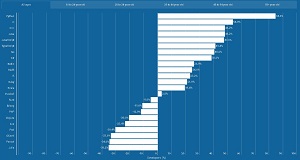News
Survey: JavaScripters Wanted, but Programmers Prefer Python
- By David Ramel
- January 25, 2018
Technical recruiting company HackerRank says JavaScript is the top programming language sought by organizations, but developers prefer Python.
Those are just two takeaways from the company's new "2018 Developer Skills Report," which surveyed more than 39,000 developers around the world. HackerRank specializes in competitive coding challenges to help employers gauge talent and help the talent prove themselves and prepare for job interviews.
The company published survey results in a comprehensive, interactive report that lets users change parameters -- such as age groups of respondents -- to drill down into the data.
Programming languages are of course a favorite topic in such surveys, and this one confirms the darling status of Python, even though employers are more interested in obtaining JavaScript and Java jockeys. Those two languages were almost tied (listed by about 47 percent of respondents) for the language employers seek most across all industries, with Python No. 3 at 33 percent.
When asked what language they prefer, however, Python ruled among all age groups except for those 55 years or older, who narrowly prefer C.
 [Click on image for larger view.]
Which Languages Do Employers Look For? (source: HackerRank)
[Click on image for larger view.]
Which Languages Do Employers Look For? (source: HackerRank)
"JavaScript may be the most in-demand language by employers, but Python wins the heart of developers across all ages, according to our Love-Hate index," the report said. "Python is also the most popular language that developers want to learn overall, and a significant share already knows it." The Love-Hate index measures the percentage of developers who love a language while subtracting the percentage of developers who dislike the language.
Also, Python was No. 2 on the list of languages developers are planning to learn next (about 32 percent), behind only Go (about 38 percent).
 [Click on image for larger view.]
Which Languages Do Developers Prefer? (source: HackerRank)
[Click on image for larger view.]
Which Languages Do Developers Prefer? (source: HackerRank)
"Python is known for its simplicity, readability, and vast possibilities of scientific libraries," the report noted. "It's also growing as part of introductory computer science courses."
Using its age-group differentiation, HackerRank offered some thoughts on generational differences among programmers about their preferred languages:
There is an unusual generational trend among newer languages: Younger developers dislike newer languages (like Go, Kotlin, and Scala) more so than older developers. In fact, Go creates one of the greatest divides. Developers aged 18-24 don't care for it, but 45-54 year-olds consider it one of their most loved languages. The inverse is true about JavaScript.
This is interesting, since many of the newer languages, including Go, embody learnings from older languages. One of Go's primary designers created C decades ago. There's an innate thirst for knowledge among younger developers. They are more likely to learn languages across the board -- even those that they dislike -- than older developers. The latter would choose their pursuit more selectively, based on their experience and what they think will stand the test of time.
Other data points from the report include:
- Node.js is the preferred dev framework (73 percent), followed by React (69 percent) and ExpressJS (56 percent).
- When measuring frameworks wanted by employers against frameworks known by developers, React had the biggest gap. "In other words, there's a big opportunity for developers to learn React as a marketable skill that companies need today."
- StackOverflow is the No. 1 tool for self-learners overall, but after that ubiquitous Q&A site, younger programmers prefer YouTube videos more than books, while older coders prefer books over videos.
- The top core competency sought by employers is problem-solving skills, with programming language proficiency coming in a distant second place.
- When gauging developer qualifications, executives most value portfolios, such as GitHub or other personal projects. Previous work experience was next, followed by years of experience.
- When hiring programmers, the biggest challenge was said to be assessing skills before an onsite visit, while resume screening was the No. 1 tool used for such assessments.
- On the other side of the coin, developers narrowly sought a good work-life balance over professional growth and learning opportunities in their job searches.
- The most important factor in contributing to that work-life balance was flexible working hours, followed by remote working and "focus on outcomes, not hours."
- VIM was by far the most popular code editor (67 percent), with Emacs coming in a distant second (14 percent) and newcomer Visual Studio Code registering with 4 percent of respondents.
Community discussion about the survey can be found on the Reddit social coding site.
The survey was conducted online, with respondents recruited among HackerRank's community by e-mail and via social media sites. The survey ran from Oct. 16 to Nov. 1, 2017.
About the Author
David Ramel is an editor and writer at Converge 360.